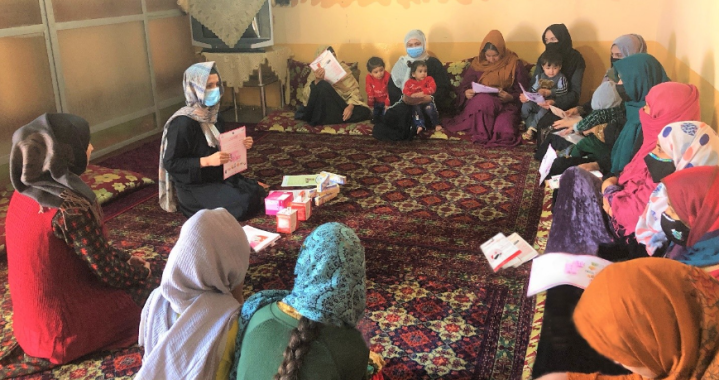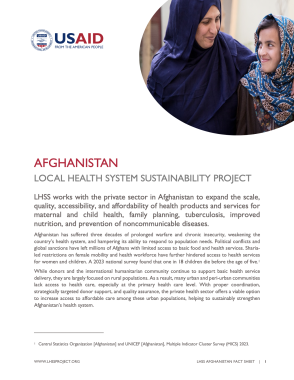Afghanistan has suffered three decades of prolonged warfare and chronic insecurity, weakening the country’s health system, and hampering its ability to respond to population needs. Political conflicts and global sanctions have left millions of Afghans with limited access to basic food and health services. Sharia-led restrictions on female mobility and health workforce have further hindered access to health services for women and children. A 2023 national survey found that one in 18 children die before the age of five.[1]
While donors and the international humanitarian community continue to support basic health service delivery, they are largely focused on rural populations. As a result, many urban and peri-urban communities lack access to health care, especially at the primary health care level. With proper coordination, strategically targeted donor support and quality assurance, the private health sector offers a viable option to increase access to affordable care among these urban populations, helping to sustainably strengthen Afghanistan’s health system and resilience.
Approach
LHSS Afghanistan is working with private sector stakeholders to expand the scale, quality, accessibility, and affordability of health products and services including maternal and child health, family planning, tuberculosis, nutrition and noncommunicable diseases in Afghanistan. Building on work of the Sustaining Health Outcomes through Private Sector Plus (SHOPS Plus) Project, led by Abt Global, LHSS Afghanistan and partner organizations are working towards building and strengthening sustainable private sector models while addressing the urgent needs of priority populations—primarily women and children—in mainly urban and peri-urban areas of five of Afghanistan's most populous provinces: Balkh, Herat, Kabul, Kandahar, and Nangahar.
Progress Highlights
- LHSS Afghanistan’s partnership with the Afghan Social Marketing Organization’s (ASMO’s) commercial pharmacy network has expanded access to health products in over 100 new markets. ASMO trained a network of more than 140 private midwives in Kabul, aimed at reaching primarily women in low-income communities. ASMO linked the midwives with private hospitals and pharmacies across Herat, Nangarhar, and Kabul provinces, to facilitate patient referrals.
- LHSS Afghanistan support for ASMO’s private sector network has resulted in over 319,000 couple years of protection through the sales of family planning methods; 143,000 person years of protection from anemia and iron deficiency in pregnant women, nutritional deficiencies among children under five, and infections in newborns; disinfection of approximately 130 million liters of water to protect families from water-borne diseases; treatment of more than 499,000 diarrheal episodes through the sale of zinc and oral rehydration salts.
- Grants to private sector organizations have resulted in 13.2 million people receiving social and behavior change messages to increase uptake of and access to critical health products and services; 939,000 patients (65% women) received essential health services; 445,000 low-income clients received free or discounted services with the help of integrated financing schemes; over 30,000 children under five years of age received nutrition supplementation.
- LHSS Afghanistan adapted the Patient Equity Support Assessment Tool for private sector organizations to efficiently and equitably identify beneficiaries for LHSS-supported integrated financing schemes for indigent populations. LHSS collaborated with private sector organizations to co-develop a plan to institutionalize the tool within each grantee’s patient welfare program. LHSS won the Metrics for Management 2024 Davidson Gwatkin Equity Measurement Prize for innovative adoption of the Equity Tool.
[1] Central Statistics Organization [Afghanistan] and UNICEF [Afghanistan], Multiple Indicator Cluster Survey (MICS) 2023.
Updated November 2024


